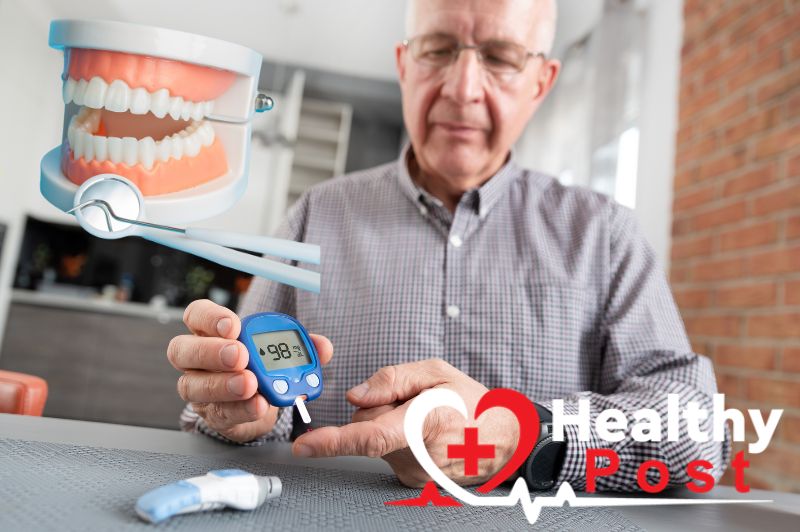Diabetics are more likely to suffer from oral diseases.
Diabetes is a common chronic disease that not only affects multiple systems of the body, but is also closely related to oral health.
High blood sugar levels can lead to an increase in dental plaque bacteria, which increases the risk of oral diseases. Diabetic patients have reduced saliva volume and increased glucose concentration in saliva. These factors reduce the oral cavity’s self-cleaning ability and leads to the growth of pathogenic microorganisms.
Diabetes also increases the incidence of oral diseases such as periodontal disease, tooth decay, and dry mouth. Among them, periodontal disease is the most common oral complication of diabetes and is known as the “sixth complication of diabetes.” According to statistics, nearly 22% of diagnosed diabetic patients will be affected by periodontal disease. As people age, poor blood sugar control will further increase the risk of gum problems.
Oral diseases affect blood sugar control
Oral diseases can also affect blood sugar control, forming a mutually deteriorating cycle.
Oral care has a significant impact on blood sugar control in people with diabetes. Studies have shown that treating gum disease can improve blood sugar control in people with diabetes and slow the progression of the disease. Specifically, practicing good oral hygiene habits and having a professional deep cleaning by a dentist can help lower glycated hemoglobin (HbA1c) levels.
Clinical observations have found that 50% of diabetic patients with poor blood sugar control will have oral diseases. After treatment of these oral diseases, the blood sugar levels of patients have dropped significantly, and nearly 20% of patients have reduced the dosage of oral hypoglycemic drugs or insulin.
Oral care is an important part of diabetes management
Poor control of blood sugar levels will aggravate these oral problems, and the worsening of oral diseases will in turn affect the stability of blood sugar, forming a vicious cycle. Therefore, if diabetic patients actively pay attention to and properly deal with oral health problems, it will have a significant positive impact on improving blood sugar control.
Oral care technology plays a vital role in the prevention, daily care, and treatment of diabetes. Effective oral hygiene measures can not only prevent and reduce the occurrence of oral diseases but also help diabetic patients better manage blood sugar and reduce the risk of complications.

Treatment strategies for diabetic oral diseases
1. General treatment
Keep the oral environment clean and remove local irritants, such as tartar, poor restorations, mouth breathing, food impaction, etc. Maintaining oral hygiene helps reduce infection. Patients are encouraged to develop good hygiene habits and undergo regular oral examinations.
2. Control blood sugar
Improving blood sugar control can help treat oral lesions, and patients are advised to monitor their blood sugar levels.
3. Infection Control
Because oral and maxillofacial infections are extremely easy to spread, gingivitis and maxillofacial infections should be actively controlled to prevent further spread of inflammation and worsening of the condition. Appropriate antibiotics can be selected based on the examination of pathogenic microorganisms.
4. Incision and drainage
Surgical treatment: Patients with periodontal abscess, acute pulpitis, oral and maxillofacial cellulitis need incision and drainage to prevent the condition from getting worse. Dentists perform other surgical treatments, including tooth extraction, root canal therapy, and dental ligature fixation.
5. Other
Symptomatic and supportive treatment of diabetes patients to control blood sugar has a significant impact on oral health.
Oral care techniques for diabetic patients
Diabetic oral care technology refers to a series of professional prevention and daily care measures taken to prevent and reduce oral diseases (such as periodontal disease, caries, oral mucositis, etc.) that may be caused by poor blood sugar control in diabetic patients, including correct brushing, flossing, regular oral examinations, teeth cleaning, and the rational use of oral care products.
1. Maintain oral hygiene
It is crucial for people with diabetes to maintain oral hygiene to reduce the risk of oral complications and prevent common diseases such as periodontal disease and dental caries.
Brush your teeth daily
- Choose a soft-bristled toothbrush and a toothpaste that suits your oral condition, and brush your teeth at least twice a day for 3 minutes each time.
- Rinse your mouth before and after meals.
- Fluoride toothpaste helps prevent tooth decay, and for patients with periodontal disease, you can choose a toothpaste that has the effect of alleviating periodontal disease.
- Replace your toothbrush every 3 months or according to bristle wear.
Flossing
Brushing your teeth can remove most food particles and bacteria in your mouth, while flossing can clean narrow spaces that brushing cannot reach, ensuring overall oral cleanliness.
Use dental floss every day to clean the gaps between teeth, remove food debris and bacteria, and prevent periodontal disease. The correct way to use it is to take 20-25 cm of dental floss, roll it into a circle, and then use your thumb and index finger to control it. Gently slide it into the gaps between teeth and scrape away dental plaque. Repeat 3 times for each gap between teeth.
Use of interdental brushes
For areas that are difficult to reach with dental floss, use an interdental brush.
Rinse your mouth after meals
Rinse your mouth promptly after meals, especially after eating sweet and sour foods. It is recommended to use light baking soda water or water to neutralize the pH of the mouth and inhibit the growth of bacteria and fungi. Drinking more water and eating sugar-free foods can help moisturize the mouth, wash away food residues and balance the acidity of the mouth, and play the role of saliva.
Denture Care
If you wear dentures, remove them after each meal and rinse them with clean water to keep your dentures and mouth clean.
2. Regular dental check-ups
Regular dental checkups are important for people with diabetes because good oral hygiene and regular dental checkups can help improve blood sugar control and slow the progression of the disease.
In addition, the probability of diabetic patients suffering from oral problems is 2 to 3 times that of ordinary people, so they need to pay special attention to oral health. Regular oral examinations are key measures to maintain oral health and promote blood sugar control.
Check frequency
It is recommended that diabetic patients undergo an oral examination at least once every 3 to 6 months to detect and treat oral problems early and prevent the disease from worsening.
Patients with stable blood sugar control should have oral examinations every six months. Dentists recommend teeth cleaning every 3 to 6 months.Regular cleaning removes dental calculus and reduces issues like periodontitis and gingival bleeding. Dentists should perform oral X-rays every 2 years. These X-rays monitor oral health and help detect difficult-to-observe lesions promptly.
Treatment for oral diseases
For oral diseases that have already occurred, such as periodontitis or caries, appropriate treatment should be selected according to the advice of the dentist. In the case of severe periodontitis, more intensive treatment such as cleaning and medication may be required.
In cases where tooth extraction is necessary, people with diabetes should use appropriate antibiotics to prevent infection and pay attention to post-extraction care.
3. Daily eating habits
Blood sugar control is key to maintaining oral health for people with diabetes. High blood sugar levels can damage oral health, so patients should control their blood sugar levels through a proper diet.
Eat a balanced diet
Diabetic patients should give priority to foods rich in vitamins, minerals, and dietary fiber, such as whole grains, fresh vegetables and fruits. These foods help prevent chronic diseases such as cardiovascular disease, diabetes, and obesity. They also have a positive effect on dental health and help prevent caries and periodontal disease.
Less oil, less salt, limited sugar, and limited alcohol
A high-sugar diet may promote the growth of oral bacteria and increase the risk of caries and other oral diseases. Therefore, diabetic patients should limit the intake of high-sugar foods and develop healthy eating habits.
Control blood sugar
Good blood sugar control is essential for reducing oral infections, healing ulcer and wounds, and relieving symptoms such as dry mouth and abnormal taste.
Conclusion
The oral health of diabetic patients is related to the health of the oral cavity itself. It is also closely connected to overall blood sugar control and diabetes management. Effective oral hygiene measures and regular oral examinations can help diabetic patients prevent and reduce the occurrence of oral diseases. These practices also aid in better managing blood sugar and reducing the risk of complications. Oral care is an indispensable part of the health management of diabetic patients.


